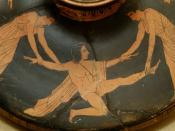In Greek tragedies wrongdoing was often severely punished, especially if the wrongdoing involved defying the gods. The gods, being superior to mortals, rarely concerned themselves with mortals except for in occasional acts of lust or acts of vengeance after being defied or angered by a mortal. Mortals who happened to anger the gods faced many misfortunes, but although the punishments of the god were both harsh and severe, they were always just.
Pentheus angered Dionysus by his failure to recognize and accept Dionysus as a god, even though Dionysus is his cousin. He then sends his servants to capture a stranger, whose head he has already threatened to cut off, whom he believes to be a worshipper of Dionysus but is actually Dionysus in disguise. Pentheus insults the stranger by calling him feminine. He also has a poor view of women and doesn't believe they are moral or are capable of controlling themselves.
He believes worshipping Dionysus is an excuse for them to be promiscuous. Of the women he says, "Then they slink off separately to lonely corners to serve the beds of men. Of course they pretend they are priestesses; inspired priestesses; but they make more of Aphrodite than of Bacchus." He plans to capture the women and put them in cages. Because of the view Pentheus has towards women and because he called the stranger feminine, Dionysus first brings a bout of madness upon Pentheus so he can convince the man to dress as a woman and parade around Thebes. This is so Pentheus will be humiliated, and he will also be wearing this dress for all eternity in the afterlife. Dionysus then plans the demise of Pentheus so the final result is his head being torn off by his mother, who believes she is killing a lion,


